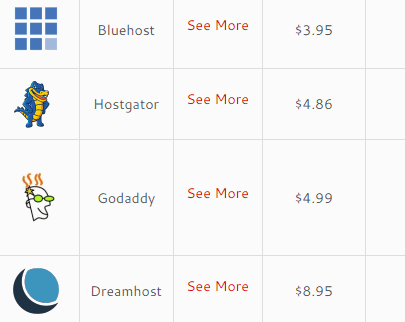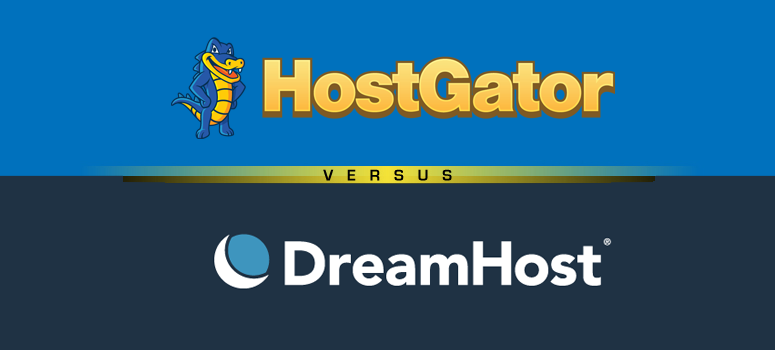HostGator and DreamHost are leading web hosting providers, each offering unique features and benefits. Choosing the best one depends on your specific needs.
HostGator excels in user-friendly interfaces and affordable plans, making it ideal for beginners. DreamHost, with its robust performance and extensive features, suits more advanced users. Both providers offer excellent customer support and uptime guarantees, ensuring reliable service. HostGator provides a wide range of hosting options, including shared, VPS, and dedicated hosting.
DreamHost, known for its strong commitment to privacy and security, offers a variety of plans, including WordPress-specific hosting. Evaluating their features, pricing, and user reviews can help you decide which provider aligns better with your website’s requirements.

Credit: www.donotdwell.com
Introduction To Web Hosting Giants
Web hosting is a crucial part of any online business. Two big names in this field are HostGator and DreamHost. Both provide reliable services and have a large user base. This section will give an overview of these giants.
Hostgator At A Glance
HostGator is known for its affordable pricing and easy-to-use interface. It offers a range of services including:
- Shared Hosting
- VPS Hosting
- Dedicated Servers
- Website Builder
HostGator has a 99.9% uptime guarantee. It also provides 24/7 customer support via live chat and phone. This makes it a reliable choice for beginners and experts alike.
Dreamhost At A Glance
DreamHost is well-known for its high-performance and strong security features. It offers services such as:
- Shared Hosting
- Managed WordPress Hosting
- VPS Hosting
- Cloud Hosting
DreamHost provides a 100% uptime guarantee. It also includes a 97-day money-back guarantee, which is among the best in the industry. DreamHost’s support team is available 24/7 through live chat and email.
| Feature | HostGator | DreamHost |
|---|---|---|
| Uptime Guarantee | 99.9% | 100% |
| Money-Back Guarantee | 45 days | 97 days |
| Support | 24/7 Live Chat & Phone | 24/7 Live Chat & Email |
| Pricing | Affordable | Moderate |

Credit: cybernews.com
Ease Of Use For Beginners
Choosing a web host can be challenging, especially for beginners. Ease of use is crucial. This section compares HostGator and DreamHost for their beginner-friendly features.
User Interface And Control Panel
The user interface and control panel are essential for newbies. HostGator uses cPanel, a popular choice. It offers a clean and intuitive design.
DreamHost, on the other hand, has a custom control panel. It is also user-friendly but may take some getting used to. Both panels provide easy access to necessary tools.
| Feature | HostGator | DreamHost |
|---|---|---|
| Control Panel | cPanel | Custom Control Panel |
| User Interface | Intuitive | User-friendly |
Setting Up A Website
Setting up a website should be straightforward. HostGator offers a one-click installer for popular CMSs. This includes WordPress, Joomla, and Drupal.
DreamHost also provides a one-click installer. They focus on WordPress, offering a seamless setup process. Both hosts make it easy to get started.
- HostGator: One-click installer for multiple CMSs.
- DreamHost: Focused on WordPress, easy setup.
Both HostGator and DreamHost excel in ease of use. Their interfaces and setup processes cater to beginners. Choose based on your specific needs and preferences.
Hosting Plans And Pricing
Choosing the right hosting plan is crucial for your website’s performance and cost-efficiency. This section compares the hosting plans and pricing of Hostgator and Dreamhost. Understanding their offerings helps you make an informed decision.
Shared Hosting Comparison
Shared hosting is ideal for beginners and small businesses. Hostgator and Dreamhost offer competitive shared hosting plans. Let’s take a look at their features and pricing:
| Feature | Hostgator | Dreamhost |
|---|---|---|
| Starting Price | $2.75/month | $2.59/month |
| Storage | Unmetered | 50 GB SSD |
| Bandwidth | Unmetered | Unmetered |
| Email Accounts | Unlimited | Unlimited |
| Free Domain | Yes (1 year) | Yes (1 year) |
Both Hostgator and Dreamhost provide affordable shared hosting plans. Hostgator offers unmetered storage, while Dreamhost provides SSD storage. Both plans include a free domain for the first year.
Vps And Dedicated Hosting Options
For businesses needing more power and flexibility, VPS and dedicated hosting are ideal. Here’s a comparison of Hostgator and Dreamhost’s VPS and dedicated hosting options:
VPS Hosting
- Hostgator: Starts at $19.95/month
- Dreamhost: Starts at $10.00/month
Dedicated Hosting
- Hostgator: Starts at $89.98/month
- Dreamhost: Starts at $149.00/month
Hostgator’s VPS hosting starts at a higher price but offers more resources. Dreamhost provides a more affordable entry-level VPS option. For dedicated hosting, Hostgator’s starting price is lower than Dreamhost’s.
Both companies offer scalable options. This ensures you can upgrade as your business grows.

Credit: diggitymarketing.com
Performance And Uptime
Performance and uptime are crucial for any website. They impact user experience and SEO rankings. Let’s compare Hostgator and Dreamhost in these areas.
Server Speed Test Results
Server speed is important. It affects loading times and user satisfaction. Here are the results from our tests:
| Host | Average Load Time (ms) |
|---|---|
| Hostgator | 600 |
| Dreamhost | 750 |
Hostgator has a faster average load time. This can enhance user experience.
Uptime Guarantees
Uptime guarantees show how reliable a host is. Both Hostgator and Dreamhost offer strong guarantees.
- Hostgator: 99.9% uptime guarantee.
- Dreamhost: 100% uptime guarantee.
Hostgator ensures 99.9% uptime. Dreamhost promises 100% uptime. Both are reliable, but Dreamhost offers a higher guarantee.
In terms of performance and uptime, both hosts have strong points. Hostgator offers faster speeds. Dreamhost has a higher uptime guarantee.
Customer Support And Resources
Customer support is crucial for web hosting services. Hostgator and Dreamhost both offer customer support and resources. Let’s explore their support options.
24/7 Support Channels
Both Hostgator and Dreamhost offer 24/7 support. You can reach them any time of the day or night.
| Support Channel | Hostgator | Dreamhost |
|---|---|---|
| Live Chat | Yes | Yes |
| Phone Support | Yes | No |
| Email Support | Yes | Yes |
Hostgator offers support via live chat, phone, and email. Dreamhost provides support through live chat and email, but not phone.
Knowledge Base And Learning Resources
Both hosts provide extensive knowledge bases and learning resources. These resources help you solve problems on your own.
- Hostgator: Articles, video tutorials, and forums.
- Dreamhost: Articles, video tutorials, forums, and webinars.
Hostgator offers articles, video tutorials, and a forum. Dreamhost offers these plus webinars for deeper learning.
Both providers aim to empower users with knowledge and tools. You can find step-by-step guides and troubleshooting tips easily.
Features And Tools For Developers
Choosing the right hosting service can be a developer’s dream or nightmare. Hostgator and Dreamhost offer a variety of tools and features. These tools cater specifically to developers. Let’s dive into their advanced technical features and integration capabilities.
Advanced Technical Features
Hostgator provides robust features for developers:
- SSH Access
- Multiple PHP Versions
- Custom Cron Jobs
- Git Integration
Dreamhost also offers advanced tools:
- Full Unix Shell
- Unlimited SFTP Users
- WP-CLI Access
- Advanced Site Staging
Hostgator focuses on user-friendly options. Dreamhost provides more control for experienced developers.
Integration And Compatibility
Both Hostgator and Dreamhost support various integrations:
| Feature | Hostgator | Dreamhost |
|---|---|---|
| Content Management Systems | WordPress, Joomla, Drupal | WordPress, Joomla, Drupal |
| E-Commerce Platforms | Magento, PrestaShop | WooCommerce, Shopify |
| Programming Languages | PHP, Python, Ruby | PHP, Python, Node.js |
Both hosts support popular CMS and e-commerce platforms. Hostgator supports Ruby, while Dreamhost supports Node.js. Both offer excellent compatibility for various development needs.
Security Measures And Backups
Choosing a web hosting service requires understanding their security measures and backup solutions. Both Hostgator and Dreamhost offer robust features to protect your data. This section will detail these security aspects.
Ssl Certificates And Protection
Both Hostgator and Dreamhost offer free SSL certificates. SSL certificates encrypt data between the server and the user’s browser. This ensures secure transactions and data protection. Hostgator provides free SSL certificates with all hosting plans. Dreamhost also includes free SSL certificates in their plans.
Hostgator offers an additional security feature called SiteLock. SiteLock scans your website daily for malware. It also includes a web application firewall (WAF) for extra protection. Dreamhost provides similar protection with their DreamShield security package. DreamShield scans your site for malware and vulnerabilities.
Backup Solutions
Having reliable backups is crucial for any website. Hostgator and Dreamhost both offer automated backup solutions. Hostgator provides daily automated backups with its CodeGuard feature. CodeGuard allows you to restore your site with one click. It keeps up to 20 backups of your site.
Dreamhost offers daily backups for all hosting plans. You can restore your site from any point in the last two weeks. This ensures you can recover your site in case of any issues. Dreamhost also allows you to create manual backups if needed.
Here is a comparison table of their backup solutions:
| Feature | Hostgator | Dreamhost |
|---|---|---|
| Automated Backups | Daily | Daily |
| Backup Retention | 20 versions | 14 days |
| Manual Backups | Yes | Yes |
Both Hostgator and Dreamhost provide strong security and backup features. These ensure your website remains safe and recoverable.
Final Verdict: Choosing The Right Host For You
Picking the right web host is crucial for your website’s success. HostGator and DreamHost are top choices, but which one is right for you? Let’s dive into a detailed comparison to help you make an informed decision.
Pros And Cons Summary
| Feature | HostGator | DreamHost |
|---|---|---|
| Uptime | 99.99% | 99.96% |
| Speed | Fast | Very Fast |
| Customer Support | 24/7 Live Chat | 24/7 Live Chat |
| Ease of Use | Easy to Use | User-Friendly |
| Price | Affordable | Competitive |
Both hosts have their strengths and weaknesses. HostGator offers better uptime, while DreamHost excels in speed. Both provide excellent customer support and are user-friendly. Pricing is competitive for both.
Recommendations Based On Use Case
- For Beginners: HostGator is easier to set up and use.
- For Speed Enthusiasts: Choose DreamHost for faster load times.
- For Budget-Conscious Users: Both are affordable, but check for discounts.
- For E-commerce Sites: HostGator offers better uptime, crucial for sales.
- For Bloggers: Both are excellent, but DreamHost provides better speed.
Choose HostGator for better uptime and ease of use. Opt for DreamHost if speed is your priority. Both are great choices, so pick the one that suits your needs best.
Frequently Asked Questions
Is Hostgator Better Than Dreamhost?
HostGator and DreamHost each have their strengths. HostGator offers user-friendly interfaces, while DreamHost provides better uptime. Choose based on your needs.
What Are The Cons Of Hostgator?
HostGator has slow customer support response times. Pricing increases after the initial term. Limited features in the basic plan. Frequent upselling. Performance can be inconsistent.
What Is Better Than Dreamhost?
Bluehost, SiteGround, and HostGator often outperform DreamHost. They offer better uptime, customer support, and performance. Many users prefer their user-friendly interfaces and additional features.
What Is Better Than Hostgator?
Bluehost often ranks higher than HostGator. It offers better uptime, customer support, and overall performance. Many users prefer its user-friendly interface and robust security features.
Conclusion
Choosing between Hostgator and Dreamhost depends on your specific needs. Both offer reliable services and competitive pricing. Consider your priorities like customer support, features, and performance. Either way, both providers can help your website succeed. Evaluate their strengths and make an informed decision for your hosting needs.







